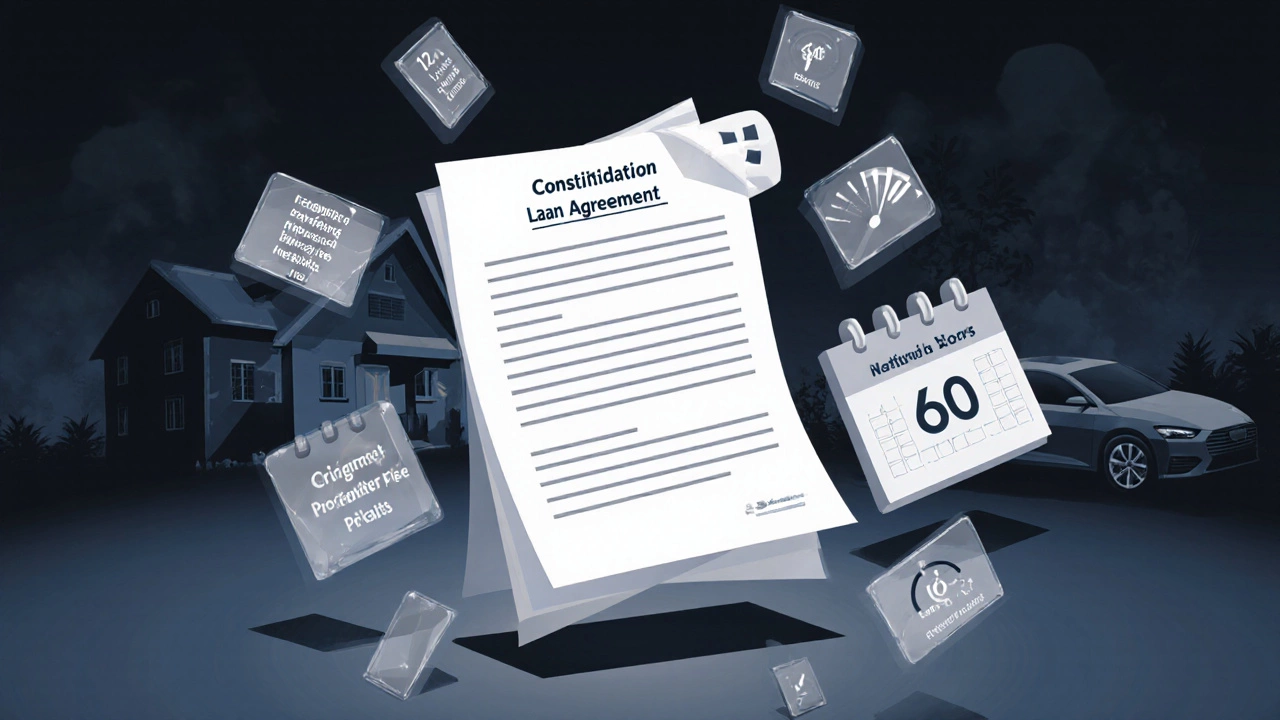Debt Consolidation Cost Calculator
Calculate Your Debt Consolidation Impact
Input your current debts and consolidation loan details to see the true cost comparison.
Current Debts
Consolidation Loan Details
When your credit‑card balances, personal‑loan payments, and other debts start to feel unmanageable, many turn to debt consolidation a process that merges several high‑interest debts into one loan, often with a lower interest rate as a quick fix. But before you sign that agreement, it’s worth digging into the negative effects of debt consolidation that can turn a short‑term relief into a long‑term headache.
Hidden Costs and Higher Interest Rates
Even if the advertised rate looks lower, the real cost may be higher once fees and the loan term are factored in. Many lenders charge origination fees, processing fees, or even pre‑payment penalties that eat into any savings.
When you compare the interest rate the percentage charged on the outstanding loan balance of a consolidation loan with the rates on your existing debts, remember to calculate the loan term the total length of time you will repay the loan. Extending a 3‑year credit‑card debt into a 5‑year personal loan often means you’ll pay more interest overall, even if the monthly payment shrinks.
Impact on Your Credit Score
The act of applying for a new loan triggers a hard inquiry, which can dip your credit score a numeric representation of your creditworthiness by a few points. Additionally, closing old credit‑card accounts after consolidation can reduce your overall credit utilization history, another factor that may lower your score.
While a lower monthly payment may help you stay current on payments-good news for your credit-in the short term the combined effect of inquiries and account closures can make future borrowing more expensive.
Longer Repayment Period and More Total Interest
One of the most common misconceptions is that a lower monthly payment automatically means you’ll be debt‑free sooner. In reality, you may be stretching a $5,000 debt over 60 months instead of 24, which pumps up the total interest paid by dozens of percent.
Consider the monthly payment the amount you owe each month on the consolidation loan. A smaller figure can feel like a win, but it often masks a larger cumulative cost that can keep you in the red for years longer than you expected.

Secured vs. Unsecured Consolidation Loans
Some consolidation offers are secured by an asset-typically your home or car. A secured loan a loan backed by collateral such as property or a vehicle may boast a lower rate, but you risk losing the collateral if you default.
Unsecured loans, on the other hand, don’t tie up an asset, but they usually carry higher rates and stricter qualification criteria. Deciding between the two can dramatically affect the risk profile of your consolidation strategy.
The Temptation to Re‑Accumulate Debt
Once high‑interest credit‑card balances disappear, many borrowers feel freed to spend again. This behavior can quickly rebuild the very debt they tried to eliminate, turning a consolidation loan into a revolving line of credit.
Understanding the difference between a personal loan an unsecured loan used for various purposes, often with fixed payments and ongoing credit‑card borrowing is crucial. If you replace a $10,000 credit‑card balance with a $10,000 personal loan but continue to rack up new charges, you may end up with a larger total debt load.
Fees, Penalties, and Unexpected Charges
Consolidation loans sometimes hide fees that only appear later: late‑payment fees, balance‑transfer fees, and even annual service fees. These add‑ons can erode the interest savings you anticipated.
For example, a late fee a penalty charged when a payment is missed or late of $35 can compound quickly if you miss several payments, pushing your loan balance higher and extending the repayment period.
Bankruptcy and Legal Consequences
Misusing a consolidation loan-especially a secured one-can accelerate the path to bankruptcy a legal proceeding that helps individuals eliminate or restructure overwhelming debt. If you lose the collateral tied to a secured loan, the lender may pursue a deficiency judgment, adding legal fees and possible wage garnishment to your woes.
In extreme cases, defaulting on a consolidation loan can damage your credit profile so severely that you might need to file for bankruptcy to reset your financial standing.

Emotional and Financial Stress
Debt isn’t just numbers on a spreadsheet; it affects your mental health. Extending debt repayment over many years can create a lingering sense of financial insecurity, often referred to as financial stress the anxiety and pressure caused by ongoing monetary obligations. This stress can influence spending habits, career decisions, and even personal relationships.
Studies from the Consumer Financial Protection Bureau (CFPB) show that individuals who feel trapped by long‑term debt are more likely to experience anxiety, depression, and lower overall life satisfaction.
How to Mitigate the Risks
- Run the numbers: calculate total interest over the life of the loan, not just monthly payments.
- Check the fine print for origination, pre‑payment, and late‑payment fees.
- Consider a secured loan only if you have a solid backup plan for the collateral.
- Commit to a strict budget that prevents new high‑interest purchases.
- Monitor your credit score before and after consolidation to gauge impact.
Quick Comparison: Consolidated Loan vs. No Consolidation
| Aspect | Consolidated Loan | No Consolidation |
|---|---|---|
| Monthly Payment | Usually lower | Higher, varies by creditor |
| Total Interest | Can be higher if term is extended | May be lower if debts are paid off quickly |
| Credit Score Impact | Hard inquiry & possible score dip | No new inquiry; score unchanged |
| Risk of Asset Loss | Potential (if secured) | None |
| Flexibility | One payment to track | Multiple creditors, more management needed |
Frequently Asked Questions
Can debt consolidation increase my total debt?
Yes. If the consolidation loan extends the repayment period, the cumulative interest can push the total amount you owe higher than the sum of your original balances.
Will a consolidation loan affect my credit score?
Applying triggers a hard inquiry that may drop your score by a few points. Closing old accounts can also reduce your credit utilization history, both of which can lower your score temporarily.
Are secured consolidation loans worth the risk?
They can offer lower rates, but you jeopardize the asset used as collateral. If you’re not confident you can meet the payments, an unsecured loan may be safer despite a higher rate.
What hidden fees should I look out for?
Common hidden fees include origination fees (usually 1‑3% of the loan), balance‑transfer fees, pre‑payment penalties, and late‑payment fees. Read the loan agreement carefully.
Can debt consolidation lead to bankruptcy?
If you default on a secured consolidation loan, the lender may seize the collateral and pursue a deficiency judgment, which can push you toward bankruptcy if you can’t cover the remaining debt.






